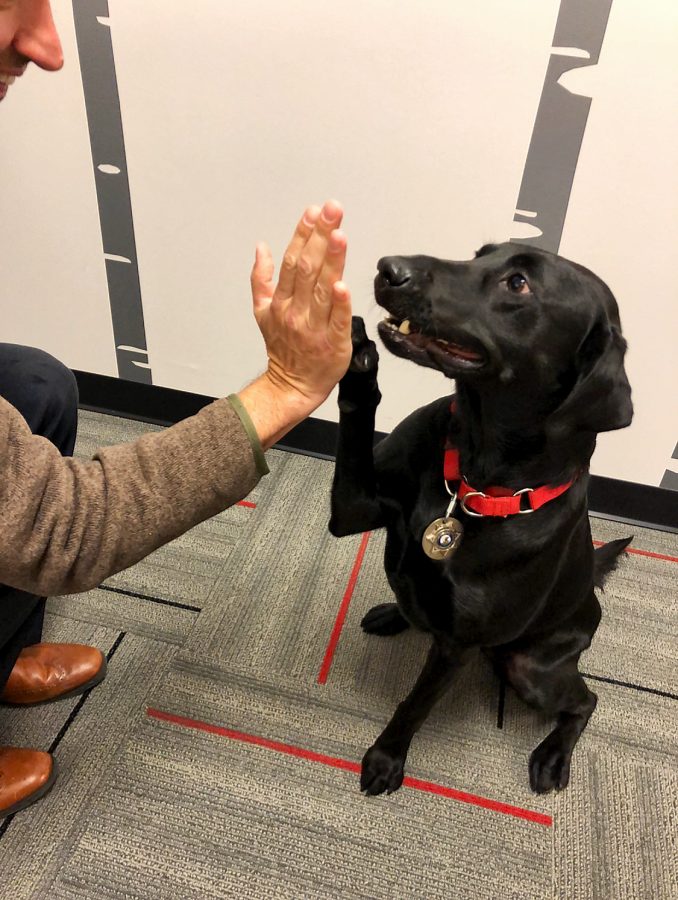Service, therapy dogs working on campus
Pawfficer Sage, ISU PD’s newest member, is a community engagement dog seen at numerous football games this fall.
December 12, 2019
Whether serving in a therapeutic or service-oriented role, dogs can be seen around the ISU and U-High campuses. These dogs serve distinct roles.*
Currently running through the halls of the ISU Police Department with a shiny badge around her neck is Sage, the community engagement dog. While here at U-High, junior Ethan Edwards is in the process of applying for a service dog from Guide Dogs for the Blind (GDB), one of the largest guide dog schools in the nation.
The calm demeanor of these dogs hides the strenuous training they and their partners have gone through.
A self-proclaimed fast walker, Edwards hopes to complete the process of getting a service dog in the next few months. The application was only the beginning. Edwards will have to pass a series of tests himself in order to be partnered with a guide dog.
Some of these steps include two phone interviews, which he has already completed. Next up, in January, he will complete an in-home interview with a GDB instructor. As part of this interview, he has to demonstrate that he can navigate a route from school to Starbucks at the Bone Student Center.
Although he feels nervous about the home interview, Edwards said he has attended various camps relating to guide dogs and learned a lot from his experiences.
“I kind of always knew the skills I would need and the questions they would ask,” he said.
Once Edwards has received approval from his eye doctor and approval for successfully navigating the route, he will most likely attend a two week class in Oregon or California to learn how to care for his guide dog. If there are not enough minors to fill a class, a staff member from GDB will come to him. Unlike many guide dog schools, GDB covers the cost of all travel and veterinary expenses involved.
Despite the great efforts required and networking all the way to the west coast, having a guide dog is a lifestyle change that Edwards is committed to. His fast walking has become more of an issue in recent years; unlike a dog, a cane cannot alert or guide him around obstacles ahead of him.
“I often bump into something before my cane gets to it,” Edwards said.
Moreover, Edwards said he feels that his cane makes him stick out in a way that he does not like.
“Socially with a dog, I feel like I would be more approachable,” he said.
Indeed, dogs have the capacity to work as social bridges, as ISU PD has discovered in the recent “hire” of their community engagement dog, Pawficcer Sage.
Despite not having the focus or intensity to be a service dog to someone who needs an accommodation, the two-year-old Sage rebounded by landing a job as a community engagement dog.
The skills she learned while training to be a service dog and her easy-going demeanor make her perfect for her primary role: to connect the community and the police.
In some cases, she also helps comfort victims of sexual assault and provide tress relief for students on campus.
“Although not designated a therapy dog, she serves in that role as well,” Chief Aaron Woodruff said.
When Sage is not working, she can truly, “be a dog” at the department. Playing fetch with tennis balls and chewing durable dog toys are her favorite past times. Sage is allowed to roam around wherever she wants, and is known for visiting the offices of those who have the best dog treats. She even knows how to high five, and is adored by everyone at the department.
“There’s usually an argument over whose office she will hang out in,” Woodruff said.
To keep track of Sage, community members can follow her @ISUpolice on Instagram or download the Redbird Life App where they list events on campus that she may appear at.
*Community members are free to greet Sage, a community engagement dog, whenever they encounter her. However, service dogs are “on duty” and should not be interacted with when they are working with their partners.
